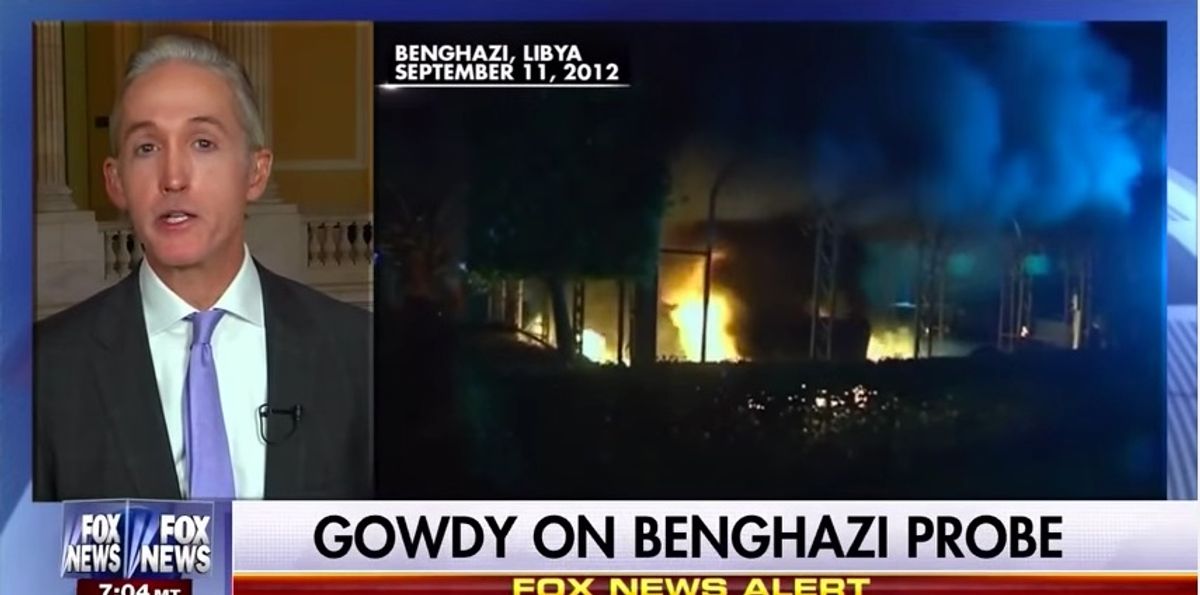During a May 2016 Fox News appearance, Select Committee on Benghazi Chairman Trey Gowdy stated that U.S. troops would have been unable to reach four Americans killed at the American consulate in Libya in time to save lives.
Gowdy's admission was not "accidental."
One of the most polarizing events of the Obama administration was an 11 September 2012 attack on the U.S. consulate in Benghazi, leaving four Americans dead and years of partisan bickering in its wake. In May 2016, comments made by Rep. Trey Gowdy, the chairman of the Select Committee on Benghazi, became popular on social media.
The controversy about Gowdy's remarks began with a 15 May 2016 letter [PDF] sent to Trey Gowdy, Chairman of the House Select Committee on the Events Surrounding the 2012 Terrorist Attack in Benghazi, by Elijah Cummings and Adam Smith, two House committee members, objecting to the former's incessant demands for information about Benghazi from the Department of Defense (DOD):
We are writing to object to your repeated, unnecessary, and ever-changing demands for information from the Department of Defense. Our nation's warfighters are charged with a solemn responsibility, but your evolving list of increasing demands is now putting a strain on the Pentagon that is completely unwarranted, unreasonable, and unjustified.
Contrary to your claims that the Select Committee has made "significant breakthroughs," the information we have received over the past two years is consistent with many previous investigations into the attack, including those conducted by the independent House Permanent Select Committee on Intelligence, and the House Committee on Armed Services.
In some cases, witnesses have provided new details, but they do not alter the fundamental conclusions of these previous investigations. None of the witnesses has provided any evidence to support reckless allegations made by Republicans to justify the creation of the Select Committee, and we have obtained no evidence that the Defense Department was ordered to stand down or withhold critical aid to those in need.
In that letter, Cummings and Smith cited January 2016 remarks made by Gowdy's former Chief Counsel, retired Army Lt. Gen. Dana Chipman, that they contended showed Gowdy's investigation to be unnecessary:
Unfortunately, your letter failed to include any statements from your own former Republican Chief Counsel — a retired three-star general with more than 33 years of service in the United States Army who repeatedly commended the military's actions on the night of the attacks during closed interviews with Defense Department officials.
For example, on January 8, 2016, the Select Committee conducted a transcribed interview with former Secretary of Defense Leon Panetta. During that interview, your former Chief Counsel stated:
I think you ordered exactly the right forces to move out and to head toward a position where they could reinforce what was occurring in Benghazi or in Tripoli or elsewhere in the region. And, sir, I don’t disagree with the actions you took, the recommendations you made, and the decisions you directed.
Your former Chief Counsel acknowledged that it is clear from the time and distances involved that none of the military forces could have gotten to Benghazi in time to save lives.
He stated:
And, again, sir, I don’t mean to suggest that anything could have been done differently to affect the outcome in Benghazi, and I think you would agree with that.
In addition, on January 13, 2016, the Select Committee conducted a transcribed interview with the Defense Department’s former Chief of Staff, Jeremy Bash. During that interview, your former Republican Chief Counsel stated:
I would posit that from my perspective, having looked at all the materials over the last 18 months, we could not have affected the response to what occurred by 5:15 in the morning on the 12th of September if Benghazi, Libya. So let me start with that positing or that stipulation ... I don’t see any way to influence what occurred there. But what I am worried about is we’re caught by surprise On 9/11, we’ve got nothing postured to respond in a timely manner — and you can debate what’s timely, what’s untimely, but nothing could have affected what occurred in Benghazi.
The conclusions of your former Republican Chief Counsel match almost exactly the findings — from more than two years ago — of the House Committee on Armed Services, which conducted its own investigation into the attacks in Benghazi. Rep. Buck McKeon, the Republican Chairman of the Committee who led that investigation, concluded at the time, “I think I’ve pretty well been satisfied that given where the troops were, how quickly the thing all happened and how quickly it dissipated, we probably couldn’t have done more than we did.
The letter also referenced unflattering comments made about Gowdy's handling of the investigation by fellow Republicans:
The letter concluded by saying that Gowdy had personally "damaged the credibility of the Select Committee beyond repair." Pundits and media critics characterized some of the Committee's activities to be a larger part of a "stand down conspiracy theory" continually unsupported by factual analyses of the events of that day.
On 18 May 2016, the Select Committee on Benghazi Democrats published a video to their YouTube channel showing Gowdy being questioned by a Fox News interviewer about Gen. Chipman's supposedly having said that no U.S. military forces could have gotten to Benghazi in time to save lives. A description published alongside that video said that Gowdy had "finally conceded" a key point:
After years of repeated Republican conspiracy theories that Secretary Hillary Clinton or others ordered the U.S. military to stand down in Benghazi or otherwise prevented a military response that could have saved American lives, Rep. Trey Gowdy, the Chairman of the House Select Committee on Benghazi, finally conceded in an interview on FOX News that the military could not have gotten to Benghazi in time to save the lives of the four Americans killed that night:
“Whether or not they could have gotten there in time, I don’t think there is any issue with respect to that — they couldn’t.”
His admission comes after Democrats released statements from his Chief Counsel earlier this week from closed-door interviews conducted by the Select Committee with Defense Secretary Panetta and his Chief of Staff, Jeremy Bash.
In response, Benghazi Select Committee Ranking Member Elijah E. Cummings, House Armed Services Ranking Member Adam Smith, and House Intelligence Ranking Member Adam Schiff issued the following statements:
“Chairman Gowdy has finally admitted what we have all known for years: the central Republican allegation that the military was told to withhold assets that could have saved lives in Benghazi for political reasons is wrong,” said Ranking Member Cummings. “Based on the Chairman’s admission today, I call on the Select Committee to stop harassing the Pentagon with baseless demands, release the transcripts of our witness interviews, and stop wasting millions of taxpayer dollars dragging out the investigation closer and closer to the election.”
During the Fox News interview, Gowdy was asked whether General Chipman had in fact "said from the beginning that nothing could be done to save the four Americans in Benghazi." Gowdy confusingly denied that was true, contesting that General Chipman's remark, as quoted by Cummings and Smith in their letter, was a "very small point" taken out of context, then himself stated that U.S. troops could not have reached Benghazi in time to save lives:
Q: There's a report that's floating out there that says your attorney, General Dana Chipman, said from the beginning that nothing could be done to save the four Americans in Benghazi in September of 2012. Is that true?
A: No, sir. Dana Chipman is an honorable man, he served his country with great distinction, and he served this committee with great distinction. That [letter] was a transcript from one question he asked Leon Panetta and Jeremy Bash. When you see the full transcript, and you will, then you will see what Dana was talking about was a very small point. The posture of the troops, the order that was given by Panetta and the President, how that order was received, all that is what we want to ask people about. Whether or not they could have gotten there in time, I don't think there's any issue with respect to that. They couldn't. The next issue is, why could you not? Why were you not positioned to do it?
Multiple online references to this interview maintained that Gowdy had "accidentally" admitted that no lives could have been saved in Benghazi, but that characterization was inaccurate: he spoke deliberately during an interview in which he appeared specifically to discuss the issue, and he followed up his statement that military forces could not have rescued the Benghazi victims by questioning why troops "were not positioned to do it." Whether Gowdy would have otherwise stated such had the controversial letter not been leaked was a matter of speculation, but it is true that he affirmed that help could not have arrived in time to save the lives of the victims of the Benghazi attacks.
Sources
Daly, Matthew. "Gowdy Remarks Stir Partisan Benghazi Feud." Associated Press. 18 May 2016.
McAuliff, Michael. "Trey Gowdy’s Former Top Lawyer Undercuts the Benghazi Committee." Huffington Post. 16 May 2016.
U.S. House of Representatives Select Committee on Benghazi. "More Than 10,000 Days of Delays: Obama Admin’s Delays of Benghazi Documents Equivalent to Over 27 Years." 18 May 2016.


